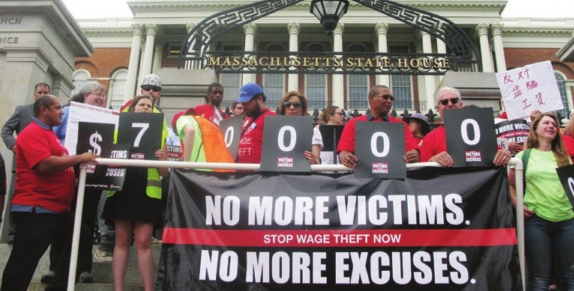

Demonstrators
led by Community Labor United marched through downtown Boston to the
State House to demand passage of an anti-wage theft bill.
Companies stiffed workers out of an estimated $700 million in Mass last yr.
Hundreds of protestors marched from City Hall to the steps of the State House last Wednesday, urging legislators to pass a bill that would give the Attorney General more tools to hold employers accountable for wage theft.
The bill, S.2546, was expected to be voted on in the Senate that day, but it was delayed and had still not been voted on as of the Banner’s press deadline.
An estimated $700 million is stolen from Massachusetts workers each year. This protest was one of a long series of recent workers’ rights demonstrations, which have included a push for increasing the minimum wage in Massachusetts to $15 and implementation of paid family sick leave. The national Poor People’s Campaign, which took to the State House and streets for six weeks this spring, included labor issues in their slate of demands.
Local support
The June 20 march began at City Hall to acknowledge the ordinances the city has already passed to combat wage theft. Isabel Gonzalez-Webster from Community Labor United emceed and led the crowd through the streets. Protesters stopped at the UMass Club to hear Janelle Quarles, president of the Classified Staff Union at UMass, speak about wage theft there.
“It seems UMass is suffering from symptoms of corporate greed, classism, racism and now thievery,” she said.
At the State House, protesters stopped to hear workers continue to share their experiences with wage theft.
Long hours, short pay
“For 12 hours of hard work each day, our employers pay us only $50 a day,” Jorge Estrada, a restaurant worker, told the crowd. “Fifty dollars, for very hard and very physical work. And they kept telling us that it was good pay, and that we should just be grateful to have a job.”
Hwang Ming, a former waiter at a hot pot restaurant, shared that his employer owed him more than $50,000 in wages.
“Our wages were deducted illegally,” he said. “We did not get minimum wage. We did not get overtime pay. We also had no real breaks. I’m a waiter. The base pay right now in Massachusetts is $3.75. The employer never paid us this base pay. All of my wages were tips. And part of the tips is shared with kitchen staff as well.”
Restitution
Cynthia Marks, Chief of the Fair Labor Division at the attorney general’s office, spoke about the work her office does to combat wage theft.
“In fiscal year 2017 the division resolved over 600 cases for almost $9 million in restitution and penalties on behalf of thousands of Massachusetts workers,” she said. “Each year we receive thousands of complaints from workers who have not been paid all of their earned wages. We help workers recover wages for violations of minimum wage laws, prevailing wage and overtime. We penalize employers for violations of child labor laws, earned sick time and other related labor laws. We believe that all workers are entitled to these legal protections, irrespective of immigration status.”
Roger Brunelle, Financial Secretary of the Painters and Allied Trades Union Local 691, shared his thoughts on the state of the S.2546 bill.
“The legislators are receptive, but I don’t know where we stand right now,” he said. “We’re counting on Senate president Harriet Chandler and Speaker DeLeo to pass something really strong for workers.”